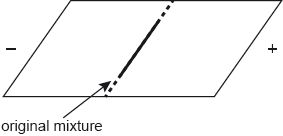| Date | November 2019 | Marks available | 2 | Reference code | 19N.3.sl.TZ0.8 |
| Level | SL | Paper | 3 | Time zone | TZ0 |
| Command term | Explain | Question number | 8 | Adapted from | N/A |
Question
Enzymes are biological catalysts.
The graph shows the relationship between the temperature and the rate of an enzyme-catalysed reaction.
State one reason for the decrease in rate above the optimum temperature.
Explain why a change in pH affects the tertiary structure of an enzyme in solution.
State one use of enzymes in reducing environmental problems.
Markscheme
enzyme denatures
OR
change of conformation/shape of active site
OR
substrate cannot bind to active site/binds less efficiently ✔
NOTE: Accept “change in structure” or “substrate doesn't fit/fits poorly into active site”
Any two of:
acidic/basic/ionizable/COOH/carboxyl/NH2/amino groups in the R groups/side chains «react» ✔
exchange/lose/gain protons/H+ ✔
change in H-bonds/ionic interactions/intermolecular forces/London dispersion forces ✔
NOTE: Do not accept “enzyme denatures” OR “change of conformation/tertiary structure” OR “substrate cannot bind to active site/binds less efficiently” as this was the answer to 8(a).
breakdown of oil spills/industrial/sewage waste/plastics
OR
production of alternate sources of energy «such as bio diesel»
OR
involve less toxic chemical pathway «in industry» ✔
NOTE: Accept “«enzymes in» biological detergents can improve energy efficiency”.


